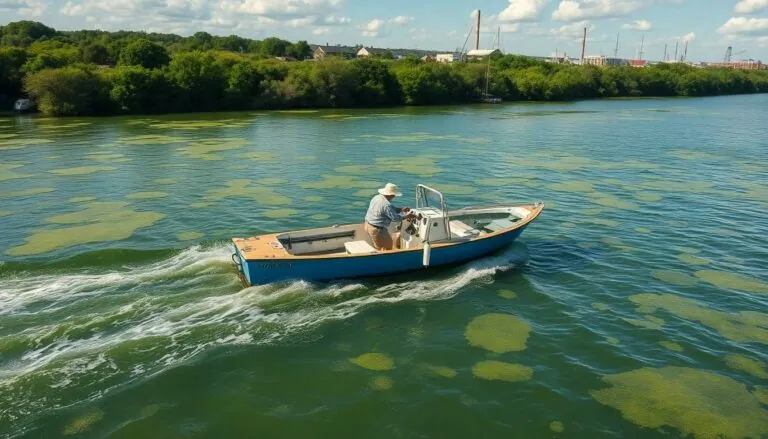Climate change often feels like a dark cloud hanging over humanity, but what if that cloud has a silver lining? Surprisingly, there’s good news lurking beneath the surface. Scientists and innovators are stepping up like superheroes in lab coats, finding solutions that could turn the tide and even make the planet a better place.
Table of Contents
ToggleOverview of Good News About Climate Change
Positive news about climate change emerges from various areas, revealing actionable progress and hope. Renewable energy sources, such as solar and wind, experienced significant advancements. In 2022, renewable energy accounted for more than 29% of global electricity generation, highlighting its growing role in reducing fossil fuel dependence.
Innovative technologies also contribute to carbon capture mechanisms. These solutions aim to remove carbon dioxide directly from the atmosphere, with projects like Climeworks successfully extracting over 7,000 tons of CO2 in 2021. Such initiatives mark a shift toward potential net-zero emissions.
Reforestation efforts continue gaining momentum across several nations. Countries like India and China actively engage in large-scale tree planting campaigns. In fact, India committed to planting 10 billion trees by 2030, enhancing biodiversity and absorbing carbon emissions.
Policy changes also reflect increased awareness and commitment to climate solutions. The implementation of carbon pricing and emissions trading systems in numerous regions encourages businesses to adopt greener practices. For instance, the European Union’s Emissions Trading System remains one of the largest, covering over 10,000 industrial plants.
Public sentiment shifts support climate action as well. Surveys indicate that nearly 70% of individuals recognize climate change as a significant threat, prompting calls for government accountability and action.
Collectively, these developments illustrate optimism in addressing climate change. Enhanced cooperation, technological innovation, and public engagement drive efforts forward. Bright prospects emerge from these initiatives, showcasing the potential for a sustainable future.
Recent Scientific Discoveries

Significant progress in fighting climate change has emerged through recent scientific discoveries. These innovations reflect a collective effort to enhance sustainability and make a positive impact.
Innovations in Renewable Energy
Advancements in renewable energy sources drive the transition towards sustainable power. In 2022, renewable energy accounted for over 29% of global electricity generation. Solar panels and wind turbines lead this charge, offering cleaner alternatives to fossil fuels. Countries are increasingly investing in these technologies, enhancing energy efficiency and reducing emissions. Notable projects, like offshore wind farms, generate substantial power while preserving marine ecosystems. Developers integrate smart grids, optimizing energy usage and storage, thus improving overall system resilience.
Advances in Carbon Capture Technology
Carbon capture technology progresses towards making the atmosphere cleaner. Climeworks has successfully implemented large-scale carbon dioxide removal systems. These systems extract CO2 from the air, addressing the critical goal of net-zero emissions. Researchers have developed innovative materials that capture carbon more efficiently, enhancing overall process effectiveness. Policy frameworks are emerging that support investment in this technology, promoting its growth and integration. With ongoing advancements, industries can substantially reduce their emissions while transitioning to greener practices.
Policy Changes and Global Agreements
Policy changes and global agreements show significant steps towards combating climate change. Innovations in climate initiatives highlight collaborative efforts and forward-thinking strategies on multiple levels.
Successful Climate Initiatives
Several successful climate initiatives demonstrate commitment to environmental progress. Carbon pricing programs, implemented in over 40 countries, encourage businesses to reduce emissions by creating financial incentives. Emissions trading systems, operating in various regions, allow companies to buy and sell emission allowances, ultimately leading to meaningful reductions in greenhouse gases. Additionally, Renewable Energy Certificates (RECs) are gaining traction, promoting clean energy generation and allowing consumers to support sustainable practices. These initiatives not only foster economic growth but also enhance public awareness about climate solutions, paving the way for broader implementation of sustainable practices.
International Collaboration Efforts
International collaboration efforts play a critical role in addressing climate change. The Paris Agreement, ratified by 195 countries, sets ambitious global targets aimed at limiting temperature rise to well below 2 degrees Celsius. Countries are increasingly sharing research and best practices, fostering innovation and encouraging nations to adopt effective strategies tailored to their unique challenges. Joint initiatives, such as the Carbon Neutrality Coalition, illustrate how collective action can amplify progress, with nations working hand in hand to meet emissions targets. Ultimately, partnership and cooperation strengthen the global response to climate change, showcasing a unified effort towards a sustainable future.
Positive Impacts on Ecosystems
Climate change presents opportunities for ecosystem benefits, fostering biodiversity recovery and habitat regeneration. Recent initiatives demonstrate significant progress in preserving the planet’s natural wealth.
Recovery of Endangered Species
Efforts to combat climate change have positively impacted endangered species populations. In various regions, conservation programs focus on protecting habitats from climate threats. For example, successful breeding programs for species like the California condor led to population increases from 27 individuals in the 1980s to over 500 today. Additionally, collaboration among organizations enhances the survival prospects of vulnerable species through habitat restoration. Notable victories, such as the rebound of the gray wolf in certain areas, showcase the effectiveness of these targeted approaches.
Regeneration of Natural Habitats
Restoration of natural habitats thrives amidst climate action efforts. Reforestation projects have gained traction, replanting millions of trees and revitalizing ecosystems. In countries like India and China, massive tree planting initiatives aim to combat deforestation and improve air quality. Coastal ecosystems benefit from efforts to restore mangroves, which protect shorelines and provide critical habitats for numerous species. Collaborative restoration projects enhance both biodiversity and climate resilience, demonstrating how proactive measures yield tangible ecological benefits.
Community Involvement and Activism
Community engagement remains vital in addressing climate change. Activists and local leaders foster grassroots movements that raise awareness, drive action, and empower individuals.
Grassroots Movements
Grassroots movements gain traction globally, uniting individuals around climate action. Organizations like 350.org mobilize communities to demand policy changes, focusing on reducing carbon emissions. Diverse initiatives, such as climate strikes and local clean-up drives, foster collective effort to protect the environment. Local advocacy groups also push for renewable energy adoption, encouraging residents to transition to solar and wind sources. These actions reflect a broader commitment to climate solutions, demonstrating that community voices can prompt government accountability and inspire sustainable practices.
Success Stories from Local Communities
Local communities showcase inspiring success stories in climate action. For instance, cities like San Diego and Melbourne have implemented innovative recycling programs, significantly reducing waste and lowering carbon footprints. Community gardens in urban areas enhance food security while promoting biodiversity and educating citizens about sustainable practices. Additionally, initiatives such as the Green Cities Coalition in Washington have led to substantial tree planting efforts, improving air quality and fostering urban green spaces. These successes highlight the impact of localized efforts, proving that dedicated communities can initiate change and contribute to a healthier planet.
Amid the challenges posed by climate change there’s a wave of optimism fueled by innovation and collective action. The advancements in renewable energy and carbon capture technologies exemplify humanity’s commitment to a sustainable future. Community involvement and grassroots movements are driving meaningful change, proving that every effort counts.
As awareness grows and policies evolve, the world is witnessing a shift towards more sustainable practices. The successes in biodiversity recovery and habitat restoration highlight the positive impacts of these initiatives. With continued collaboration and determination, there’s hope for a healthier planet for future generations.





